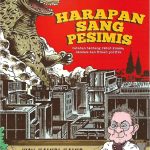
If you have read ‘Freakonomics’ by Dubner & Levitt and searching for a kind of book that provide the same unconventional, myth-busting analysis on economics occurrence, this book is definitely it!
Written in layman term without heavy technical terms, Chang open the access gate to wide range of ordinary readers about the working of economics. As he himself noted in the introduction, you don’t need to be an economist to understand his book. He lay out his aim explicitly on what he intended to do, which is to exposed free-market capitalism, he still believes that capitalism is the best economic system, his problem lay on specific type of capitalism which has dominated the world economy which is the free-market capitalism.
Chang argues that free market does not exist. Every market has rules, boundaries, and restriction which govern them. As we accept all these rules unconditionally, we fail to see them as market restriction. Labor market has many restrictions, you can’t hire child laborer this day. Also, most countries have immigration control to protect local labor market, and to hold the wage standard from falling. All these restrictions were not been put based on sound economic reason, they are political decisions. That is why Chang argues that the free-marketeer was as political as the one who opposed them.
Workers in rich countries doing the same job are paid more compared to their counterpart in poor countries. Why is this so? It is not because of the people in rich countries are more productive, brilliant, or creative. It is precisely because of the immigration control that retain the wage standard. The gap also presented not because individual in rich countries are highly educated, it is because they have better technologies, better institutions, and better infrastructure. This line of analysis is consistent with what was presented by Turkish American economist, Daron Acemoglu and British political scientist, James A. Robinson in their famous book ‘Why Nations Fail’.
Chang discussed about Alexander Hamilton, the first Treasury Secretary and the architect of the modern American economic system. Hamilton laid out protectionism strategy to protect American industries ‘in their infancy’. Have he come up with the same policy that develop America then today, Chang argued that he will be criticized by US Treasury Department and denied loan by IMF and World Bank. Chang brilliantly argued that developed countries forced market liberalization on developing countries, whilst they themselves used protectionism policy when they were developing. In other words, the rich countries said to poor countries “do what we say not as we did”.
Why do European migrated to the U.S. in 1880-1914? – asked Chang. He argued that the New World lack of feudal legacy which led to higher social mobility compared to the Old World. The U.S. also had a massive tract of land and a shortage of labour, thus wages are three to four time higher than Europe. But he argued, today American does not have the highest living standards. They worked longer hours and had inferior healthcare system. Average income also did not gave an accurate living standard in the U.S. as she had a bigger unequal income distribution, with bigger size of underclass.
Chang also criticized many economist approaches on the question of Africa’s poverty. Chang argued that rather than blaming free-market policy failure to develop Africa, free-market economist shift the blame towards Africa’s geography, climate, history, demography and ‘resource curse’. While all these factors are not all irrelevant, the outcome can change, for example, there are many resource-rich countries that were well developed. Some factors like geography and history cannot solve the question as they can’t be change. The most important factor, Chang noted, is policy. Policies can be change when they failed, especially and evidently in Africa.
On trickle-down economics, Chang brought evidence that the policy failed to deliver its promise and failed to accelerate growth. The book also discussed the failure of micro-credit, as a system to finance small enterprise and lift people out of poverty. The idea was famously attributed to the economist who won a Nobel Peace Prize, Muhammad Yunus and his Grameen Bank. Factors for the micro-credit failure includes the used of the funding for consumption, not for their initial intended purpose. While some used the funding for their business, the business failed to develop and re-create itself once their market was overcrowded and profit fell.
One of the most profound idea I found in the book is on how we limit our choices to make decision. Chang brought this idea base on Herbert Simon’s thought. Human cannot easily make decision when they were flooded with seas of information. That is why we develop routine, although they might be a better way to do things, people stick to routine so that they don’t have to make too many decisions. Market, Chang argued, were far more complex with billions of product, people, and companies. So, government intervention using regulations is justified, to limit the uncertainties and risk in the market, so that we can make a more rational and easier decisions.
Switzerland is one of the top few richest and most industrialized countries, but it is by far the lowest in term of university enrollment. Chang argued that excessive education does not lead to more productive economy. Subject such as history and biology does not much needed for average factory workers. He argued that knowledge-based economy is an exaggeration with many rich countries still rely on their manufacturing output, so, developing countries cannot skip manufacturing phase of the economic development.
Equality is not enough, said Chang. It does not make any sense if a rich boy and poor boy given the same opportunity to attend school, but the poor need to compete with a hungry stomach. So, its not just the opportunity to enter competition needs to be given, but the condition must be equalized.
His logic about big government is a compelling one. Big government he argued, make the economy more dynamic. When basic income was guaranteed, people will not be afraid of changing jobs from sunset industries into sunrise industries. When government provide re-skilling opportunities, people can more easily shifted from less productive industry into more productive one. People don’t afraid of loosing job because they know it will not be the end of the world, they have a safety net, and can move on.
Overall, the book is very rich with myth busting, facts, case studies, jokes, that will transform your understanding about economics. You know that the system is broken, but it is broken for a wrong reason and can be fix. The fix, as argued by professor Chang in his concluding remark, will not be comfortable or fair, but it is needed to give a chance for billions of people, and alleviate them from poverty.
Related Posts
Author of several books including Berfikir Tentang Pemikiran (2018), Lalang di Lautan Ideologi (2022), Dua Sayap Ilmu (2023), Resistance Sudah Berbunga (2024), Intelektual Yang Membosankan (2024), Homo Historikus (2024), DemokRasisma (2025), dan Dari Orientalisma Hingga ke Genosida (2025). Fathi write from his home at Sungai Petani, Kedah. He like to read, write and sleep.





